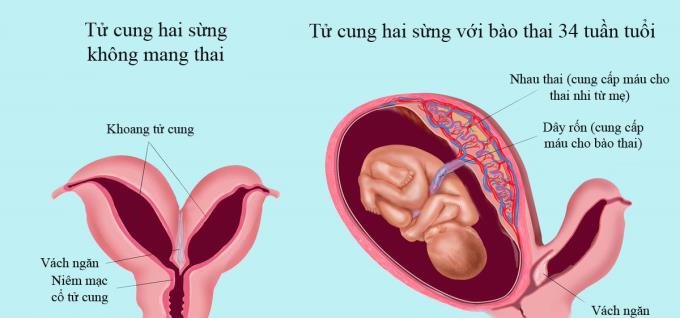The bipedal uterus is a form of birth defect. This is one of the most common forms of uterine abnormality. Most women with a bipedal uterus do not know they have this defect until they go to a gynecological examination with an imaging diagnosis or antenatal check.
So what is a two-horned uterus? Does this defect affect a woman's fertility and is dangerous for the pregnant woman and her fetus? Invite you to learn about this with aFamilyToday Health .
1. What is the bipedal uterus?
The bipedal uterus (heart shaped uterus) is a scientific term originating from the Latin language. The reason is called a bipedal uterus because the two sides of the uterus have a protruding part like a horn, in the womb there is a septum.
2. The cause of the bipedal uterus
The biconcave is a birth defect . This defect is caused by an abnormality in the merging of two parenteral tubes (also known as Mullerian tubes) during embryo formation. If this merger is not complete, it will lead to bicamolar uterine defects, more severe than the twin uterus. In these cases, the capacity of the uterus is small, so it is easy to lead to conditions such as premature birth, premature rupture of membranes, low birth weight, abnormal pregnancy ... There is currently no medical method that can prevent defects. this.
3. Symptoms
About 3% of women have an abnormal uterus. These could be abnormalities in the size, structure or shape of the uterus. The biconcave is one of the most common forms of uterine abnormality.
In most cases, the uterus is not detected until before you have a gynecological visit or become pregnant. Most women with a bipedal uterus have no signs of any abnormality. However, a small number of women with a bipedal uterus may experience one of the following symptoms:
Abdominal pain and discomfort during ovulation days
Unusual vaginal bleeding
Excessive pain during menstruation
Pain during intercourse
Miscarriages many times.
If you have one or more of the above symptoms, you should see a doctor as soon as possible to be diagnosed by a doctor and give prompt treatment.
4. Methods of diagnosis
After a physical examination, your doctor may order you to examine and do tests to be able to make the most accurate diagnosis:
Pelvic exam
Gynecological ultrasound
Magnetic resonance imaging (MRI)
Hysterosalpingogram (HSG): a close-up scan or X-ray of the uterus and fallopian tubes after a special dye is injected. This is a non-invasive medical method that helps the doctor accurately assess the situation to come up with the best treatment.
Endoscopy: This method helps the doctor properly assess the condition of the uterus so that the correct treatment can be made, as well as treating the problem of unusual bleeding (if any).
5. Risk of pregnancy complications with pregnant mothers with a two-horned uterus

Pregnant mothers who have a two-horned uterus during pregnancy often experience the following obstetric complications:
Miscarriage is easy
The fetus is slow to develop
Preterm birth.
Women with a bicampled uterus have a high risk of miscarriage later in pregnancy, and the baby is at risk of having a growth delay or premature birth due to the limited volume of the uterus. The cause of these complications may be abnormal uterine contractions or an abnormal uterine shape that reduces the ability of the uterus to feed the fetus or the placental position of the placenta in the uterus. advantage.
The rate of miscarriage among pregnant women with a two-horned uterus accounts for 1.8 - 37.6% of miscarriages, while the risk of preterm birth accounts for 15-20%. In case the mother is pregnant too soon, the baby will be raised in an incubator and under the supervision and special care of medical staff.
The bipedal uterus usually has a small capacity that limits the fetal development, leading to delayed fetal development. Normally, the weight of the fetus born to a mother with a two-horned uterus will be 10% lighter than the weight of a baby born of the same gestational age.
One study has shown that pregnant women with a two-horned uterus are four times more likely to have a baby with birth defects than women with a normal uterus. However, do not worry too much if you have a two-horn uterus because there are many cases where women with a two-horned uterus still have healthy babies.
6. Methods of treatment
Usually, a woman with a biconcave does not need treatment or surgery if she doesn't want to have a baby. But if you plan to get pregnant or have had multiple miscarriages, your doctor will prescribe reconstructive surgery of the uterus. Note that it takes about three months to get pregnant after the surgery. This reduces the risk of pregnant women having a ruptured uterus during labor, preventing mother and baby from dangerous pregnancy complications.
Pregnant women with a two-horned uterus should be monitored and checked regularly for pregnancy health to minimize the risk to the fetus. Pregnant women with a two-horned uterus may receive an injection of the hormone progesterone as soon as possible. Usually, doctors will prescribe progesterone injections from the first few weeks of pregnancy, lasting until 36 weeks. The injection of progesterone helps to thicken the uterine wall or the uterine lining to help the uterus of the pregnant mother keep the baby for longer. Thanks to that, the risk of preterm birth is somewhat reduced.
Pregnant women with a two-horned uterus are often prescribed by a doctor to perform an operation instead of a vaginal delivery. Caesarean section helps reduce pregnancy complications.












